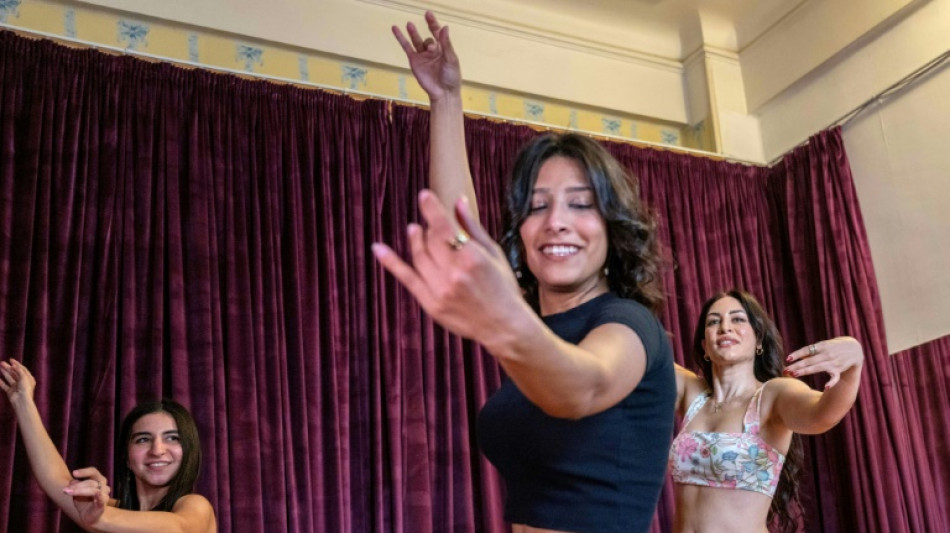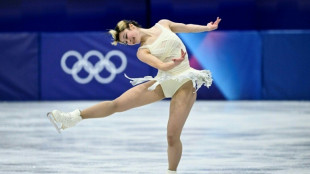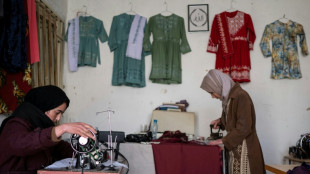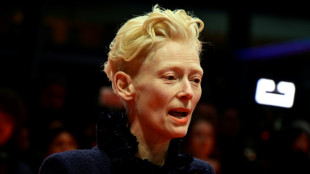
-
 UEFA to investigate alleged racist abuse of Vinicius
UEFA to investigate alleged racist abuse of Vinicius
-
'It's my story': US skater Liu looking to upset Sakamoto and Japanese

-
 Cricket: T20 World Cup Super Eights explained
Cricket: T20 World Cup Super Eights explained
-
Rennes turn to Haise to replace Beye as coach

-
 Ton-up Farhan helps Pakistan seal Super Eight spot with Namibia rout
Ton-up Farhan helps Pakistan seal Super Eight spot with Namibia rout
-
Norway's Klaebo extends all-time Winter Olympics golds record to 10

-
 Spanish police arrest hacker who booked luxury hotels for one cent
Spanish police arrest hacker who booked luxury hotels for one cent
-
Russia, Cuba slam US in Moscow show of solidarity

-
 Germany's Merz casts doubt on European fighter jet plan
Germany's Merz casts doubt on European fighter jet plan
-
Snowboarder Su Yiming wins China's first gold of Milan-Cortina Olympics

-
 How Real Madrid's Vinicius became repeated target of racist abuse
How Real Madrid's Vinicius became repeated target of racist abuse
-
Prince William opens up on mental health, understanding his 'emotions'

-
 Farhan ton takes Pakistan to 199-3 in must-win T20 World Cup match
Farhan ton takes Pakistan to 199-3 in must-win T20 World Cup match
-
French hard left reports 'bomb threat' after far-right activist killing

-
 Gabon cuts off Facebook, TikTok after protests
Gabon cuts off Facebook, TikTok after protests
-
India celebrates birth of cheetah cubs to boost reintroduction bid

-
 Greek taxis kick off two-day strike against private operators
Greek taxis kick off two-day strike against private operators
-
Turkey MPs back moves to 'reintegrate' former PKK fighters

-
 Sri Lanka unfazed by England whitewash ahead of Super Eights clash
Sri Lanka unfazed by England whitewash ahead of Super Eights clash
-
Shiffrin primed for Olympic gold after rapid first slalom run

-
 Dog gives Olympics organisers paws for thought
Dog gives Olympics organisers paws for thought
-
South Africa fire Super Eights warning to India with UAE romp

-
 Ukraine war talks resume in Geneva after 'tense' first day
Ukraine war talks resume in Geneva after 'tense' first day
-
US tech giant Nvidia announces India deals at AI summit

-
 US comedian Colbert says broadcaster spiked Democrat interview over Trump fears
US comedian Colbert says broadcaster spiked Democrat interview over Trump fears
-
Kenyan activist fears for life after police bug phone

-
 Isabelle Huppert sinks teeth into Austrian vampire saga
Isabelle Huppert sinks teeth into Austrian vampire saga
-
Peru to elect interim leader after graft scandal ousts president

-
 French designer threads a path in London fashion week
French designer threads a path in London fashion week
-
Hungarian star composer Kurtag celebrates 100th birthday with new opera

-
 Congolese rumba, music caught between neglect and nostalgia
Congolese rumba, music caught between neglect and nostalgia
-
'Close our eyes': To escape war, Muscovites flock to high culture

-
 Denmark king visits Greenland
Denmark king visits Greenland
-
Uncut gems: Indian startups embrace AI despite job fears

-
 Ukraine war talks to resume in Geneva as US signals progress
Ukraine war talks to resume in Geneva as US signals progress
-
Harrop eyes 'Skimo' gold in sport's Olympic debut

-
 Junk to high-tech: India bets on e-waste for critical minerals
Junk to high-tech: India bets on e-waste for critical minerals
-
Struggling farmers find hope in India co-operative

-
 How Latin American countries are responding to Cuba's oil crisis
How Latin American countries are responding to Cuba's oil crisis
-
Philippines VP Sara Duterte announces 2028 presidential run

-
 Asian stocks up, oil market cautious
Asian stocks up, oil market cautious
-
Peru Congress impeaches interim president after four months in office

-
 Hungry, wounded, orphaned: South Sudan's children trapped in new conflict
Hungry, wounded, orphaned: South Sudan's children trapped in new conflict
-
UK manufacturers struggle under sky-high energy bills

-
 New tech and AI set to take athlete data business to next level
New tech and AI set to take athlete data business to next level
-
'Pay or he dies', families told as more Egyptians risk Mediterranean crossing

-
 Indonesia coal plant closure U-turn sows energy transition doubts
Indonesia coal plant closure U-turn sows energy transition doubts
-
Ukraine war talks to resume in Geneva with no sign of progress

-
 Afghan woman's boutique brightens Bamiyan
Afghan woman's boutique brightens Bamiyan
-
Zuckerberg to testify in landmark social media addiction trial


'In our blood': Egyptian women reclaim belly dance from stigma
As belly dancing gains popularity internationally, young Egyptian performers are working to restore its reputation at home, pushing back against decades of stigma to reclaim the dance as part of their artistic heritage.
Once iconic figures of Egypt's cinematic golden age, belly dancers have watched their prestige wane, their art increasingly confined to nightclubs and wedding halls.
"No woman can be a belly dancer today and feel she's truly respected," said Safy Akef, an instructor and great-niece of dance legend Naima Akef, a fixture on the silver screen during the 1950s.
Despite her celebrated lineage, Safy, 33, has never performed on stage in Egypt.
"Once the show ends, the audience doesn't respect you, they objectify you," she told AFP.
Today, belly dance is known for skin-baring theatrics performed by foreign dancers and a handful of Egyptians.
The shift has fuelled moral disapproval in the conservative society and pushed even the descendants of iconic starlets away.
"People ask me all the time where they can see belly dancing that does justice to the art," said Safaa Saeed, 32, an instructor at a Cairo dance school.
"I struggle to answer," she told AFP.
Saeed, who was enchanted by Akef as a child, is now part of a movement led by choreographer Amie Sultan to reframe the art as part of Egyptian heritage, fit for theatres, festivals and UNESCO recognition.
- Colonial baggage -
A classically trained ballerina turned belly dancer, Sultan prefers to call what is formally known as oriental dance baladi, from the Arabic word "balad", meaning homeland.
"Baladi reflects the soul of who we are."
"But now it carries images of superficial entertainment, disconnected from its roots," she told AFP.
This disconnection, Sultan said, stems from shifting moral codes -- and colonial baggage.
In her book "Imperialism and the Heshk Beshk", author Shatha Yehia traces the artform's roots to ancient Egypt, but says the modern colloquial term only emerged in the 19th century, coined by French colonisers as danse du ventre, or "dance of the belly".
While descriptive, the phrase exoticised the movement and shaped perceptions both at home and abroad.
"Heshk beshk", an old onomatopoeic Egyptian expression evoking a performer's shaking moves, "is not merely a label for the dancer", Yehia writes.
"It is the Egyptian vernacular version of a femme fatale, the destructive woman who wields her body and feminine power to get what she wants. It's not just a label of vulgarity or immorality, it's synonymous with evil and debauchery."
Yehia argues that views on "heshk beshk" -- now shorthand for provocative, lowbrow dancing -- were shaped both by Western imperialism and local conservatism.
The fallout has been generational.
Akef's great-aunt was a star who "acted, danced and created iconic film tableaux".
But Safy instead has chosen to train others, including in Japan, where she spent three years teaching Egyptian folk and belly dance.
- 'Place of our own' -
Sultan launched the Taqseem Institute, named after the improvisational solos of Arabic music, in 2022.
Since then, dozens of women have been trained at the school, seven of whom now teach full-time.
The students are trained not only in choreography, but also in musicality, history and theory.
They study the evolution of Egyptian dance from pre-cinema figures like Bamba Kashshar and Badia Masabni through the golden age icons like Tahiya Carioca and Samia Gamal.
Sultan even takes the message to universities, giving talks to demystify the art form for new audiences, while her dancers work to preserve its history.
In 2023, she staged El-Naddaha, a performance blending Sufi themes with traditional and contemporary Egyptian movement.
Still, challenges remain.
"We want to have a place of our own -- like the old theatres -- a teatro where we can regularly perform," Saeed said.
Sultan is also pushing for official recognition.
She has begun the process of campaigning for the dance to be inscribed on UNESCO's Intangible Cultural Heritage list.
But the path is long and requires support from the country's culture authorities.
For the time being, the dancers at Taqseem focus on their next performance.
Barefoot and clad in fitted dancewear, they hold one final run-through, undulating to a melody by Egyptian diva Umm Kulthum as the beat of a tabla drum echoes.
It's a dream come true for Saeed, who has been dancing since she was a child.
"I believe it's in our blood," she said with a smile.
J.Oliveira--AMWN

